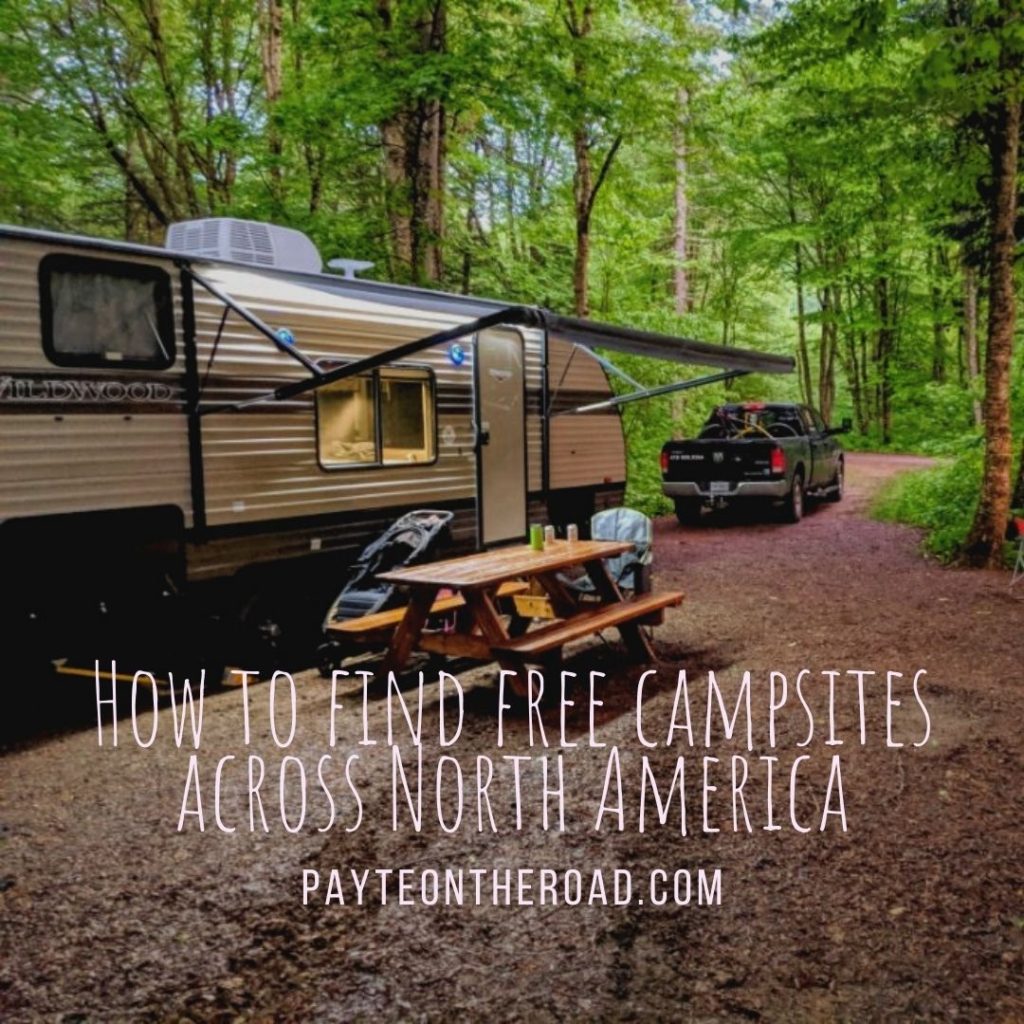How to find free campsites across North America
While planning your great adventure is fun, sometimes, you also want to have incredible experiences but still save a couple of bucks. One way to do so is by doing some dispersed camping along the way. Not only will camping be cheaper than staying in hotels or other accommodations, but you can also find free campsites too!
So keep on reading to get all my tips to help you find some free campsites all over North America!
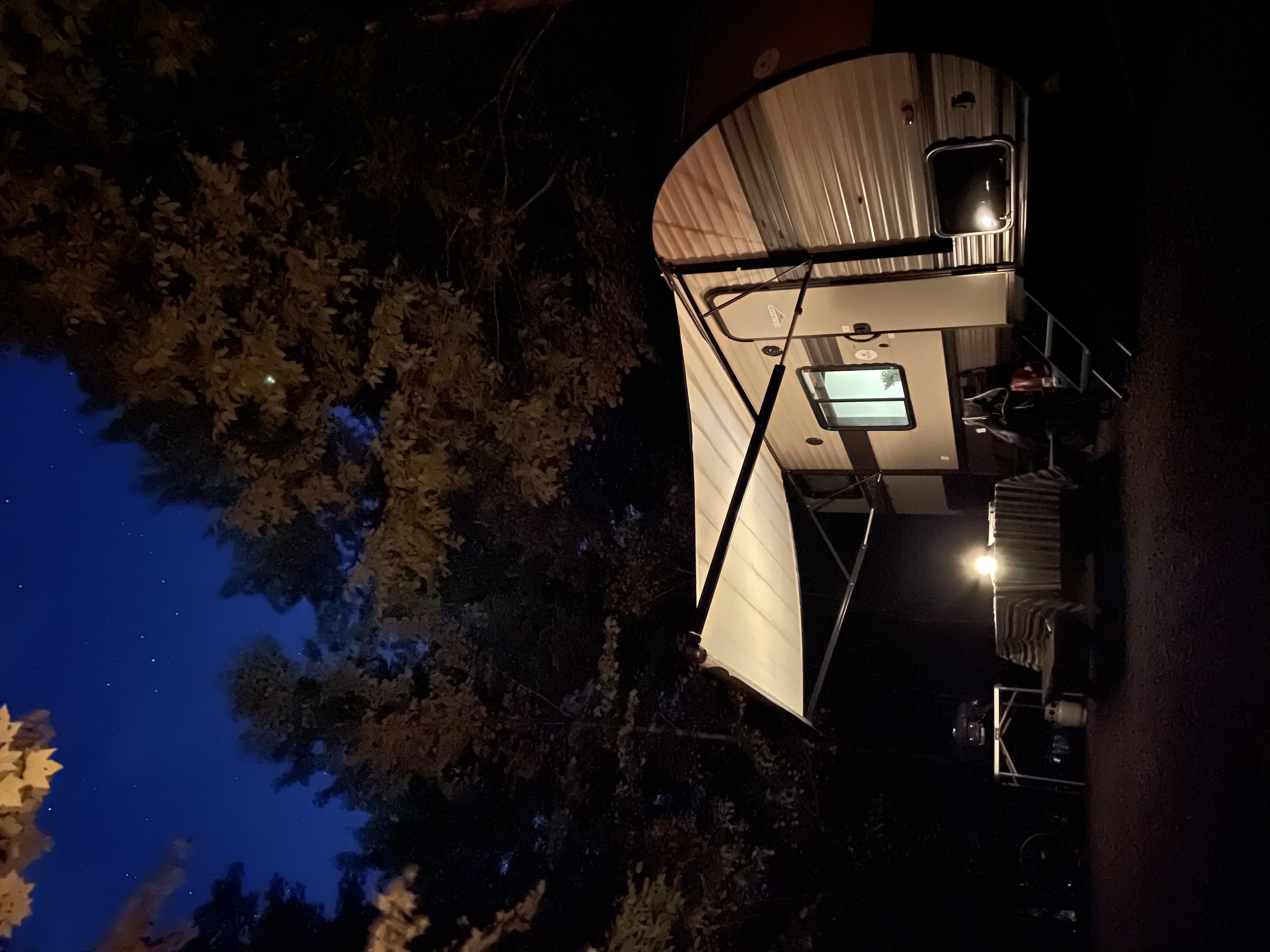
So what exactly is dispersed camping
There are different types of free camping you could be practicing. Here are the principal ones.
- Boondocking basically means when you are camping with your RV without any water, sewer, or electrical connections. It can be camping in the backcountry or even just staying in a rest area for the night. Boondocking also means that you are self-sufficient while camping.
- Dispersed Camping is the term given in the United States for camping on public land other than campsites. It is most common in natural forests and the Bureau of land management.
- Stealth Camping means sleeping in your RV or van without being noticed or drawing attention to yourself. This can be done in urban areas or wild areas. Sometimes, it is considered legal, and in some other places not that much.
- Dry Camping is just another term for boondocking. You will set up somewhere with no hookups.
- Backcountry Camping is when you camp in a remote and isolated area where you must be self-sufficient. Backcountry camping also means you will be away from a nearby road, or developed area. You won’t have access to facilities either. You will most likely be hiking somewhere to get to your camping spot for the night.
- Primitive Camping is basically you, your tent, and your gear. It is also another term for backcountry camping. You will most likely be camping in a remote area without any amenities available around you.
- Wild Camping is overnighting outside of a designated campground. Somewhat similar to backcountry and primitive camping.
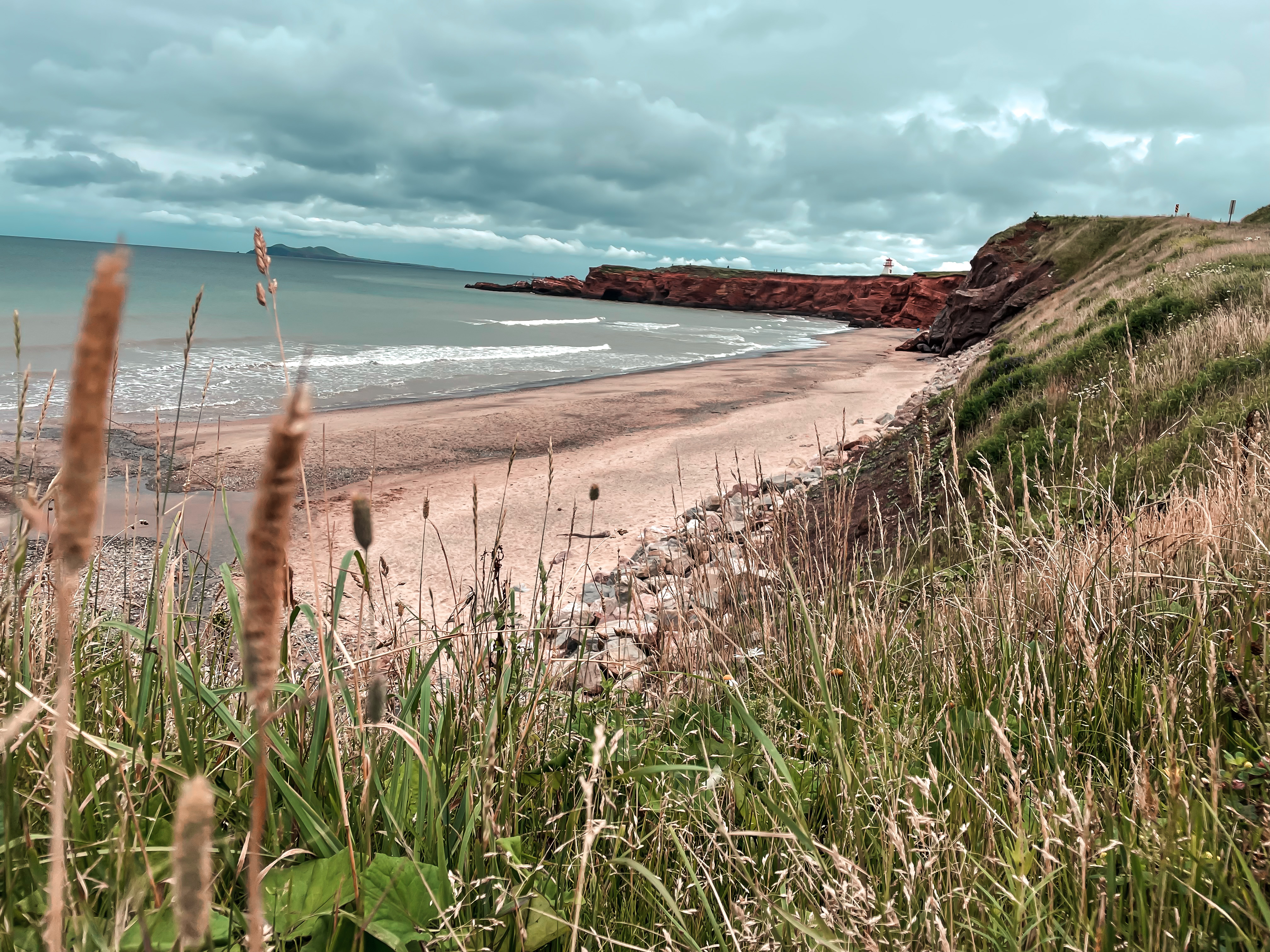
Benefits of free camping
- The most obvious benefit of free camping is that it’s free! If you are on a budget and don’t have that much to spare to stay in a campground every night, this can be a great option for you.
- Another advantage is the flexibility that free camping will give you. You won’t NEED to be somewhere overnight because you have a reservation somewhere. It will give you the flexibility to sleep where you want, wherever you are at that point. If you want to have an early night in or a late-night drive, you will be able to do so.
- Last-minute trips will be something you will be able to consider. You might add on to your original plan just because you are not obligated to be somewhere because you’ve made reservations. It will give you the freedom to change your itinerary as you want and go on a last-minute detour.
- While planning your trip, you won’t have to worry about making any reservations ahead of time to make sure you have a spot once you get there. Free camping will allow you to go with the flow and not make any reservations ahead of time.
- Seclusion and solitude are other advantages of doing some free camping. You will avoid crowded campgrounds where you are staying right beside your neighbor. You will most likely be able to find somewhere to stay overnight with either no one or only a couple of people sharing the same spot.
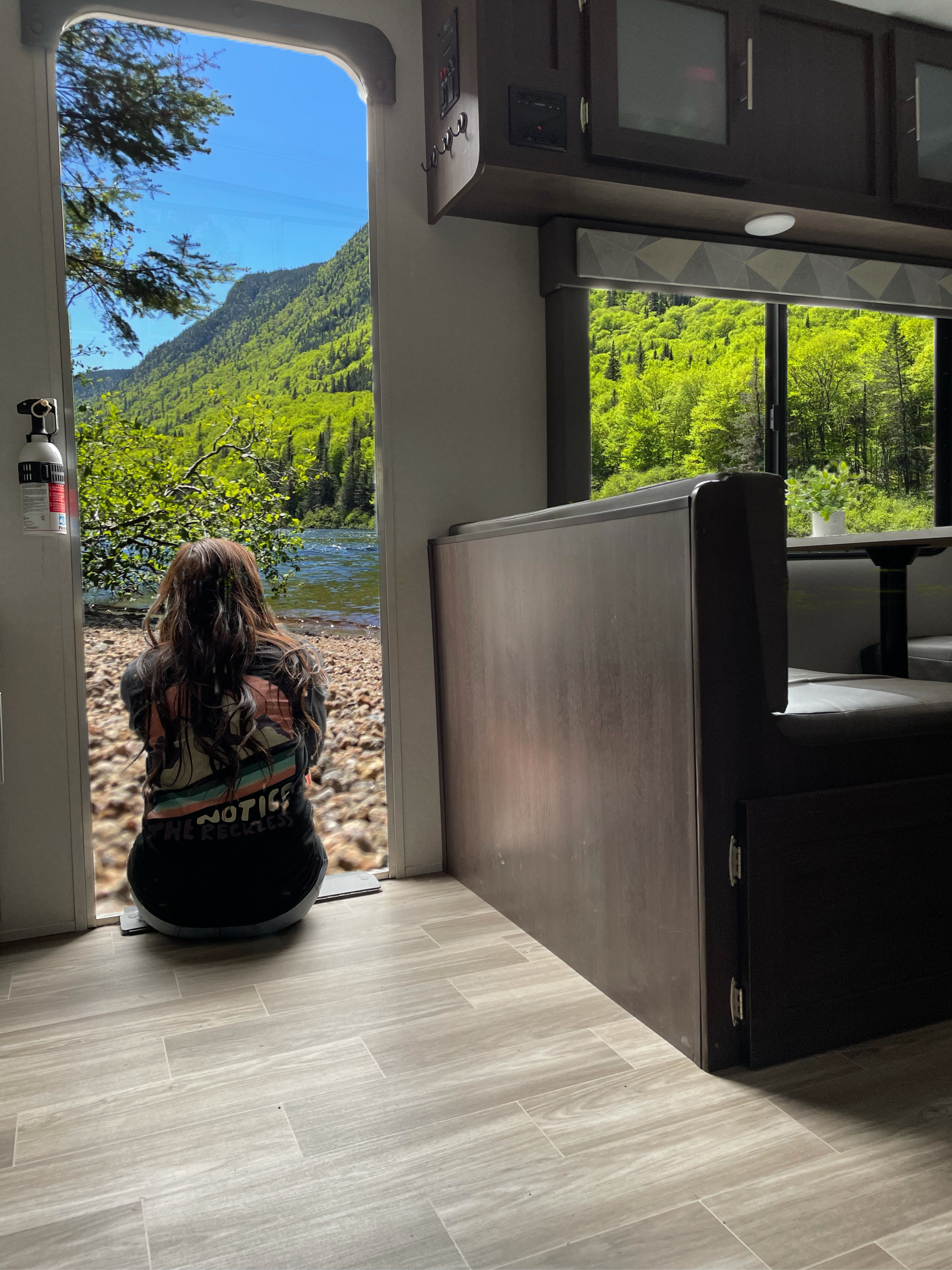
What to expect
- Fire regulations: Chances are, you won’t have a fire ring to enjoy a fire in the evening. If you are planning on making a fire, make sure to be careful with your surroundings and respect the fire regulations in place. If there is a fire ban because the weather has been too dry, make sure to follow it.
- Road conditions: Check the accessibility of your planned camping spot. You might not have the right equipment to get there. If the camping site is only accessible with a 4×4 don’t risk going up there if you’re not well equipped. This could end up into a not very pleasant experience for you. Roads leading there could be either unmaintained or rough.
- Water availability: There probably won’t be any potable water at the campsite. This means, bring some with you. Fill up your water tank in your RV or van, and bring extra water. I like to carry a full jug of water everywhere I go camping. You can use it to clean up the dishes, freshen up, and drink.
- Campsite Amenities: Camping somewhere wild, you won’t have all the amenities a campground will offer. Amenities such as a shower, freshwater, a dumping station, trash cans or recycling, and tables at your site are just a couple of examples of what you are probably not going to have while using a free campsite. Make sure you bring what you need to be prepared.
- Cell service: Depending on the area you are in, you might get some good cell service or you might end up with nothing. It really is a hit-or-miss situation.
While sleeping in your car to save a couple of bucks is great and will give you great experiences you’ll remember, it’s also very important to be mindful of the laws in place. Some places are just not for camping. Make sure you follow laws for sleeping in your car. While some countries or even a state will allow it, it can be the complete opposite just a couple of hours away. Do some research to know if it is legal or not before doing so.
Also, make sure to leave the space exactly as you found it or better so the next camper can enjoy a nice spot. Pick up after yourself. Don’t leave stuff behind. Everything you bring with you has to go back with you.
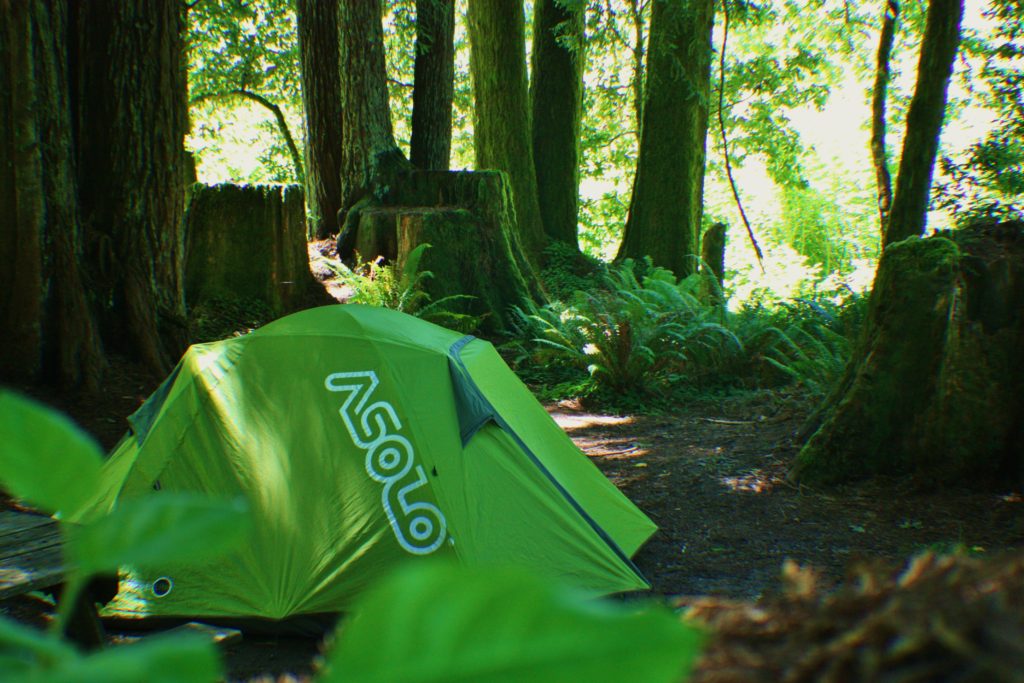
Land where free camping is usually found
Bureau of land management (BLM)
The BLM is an agency within the USA responsible for Federal lands. Its mission is to sustain the health, diversity, and productivity of public lands for the use and enjoyment of present and future generations.
This is a great opportunity to use these lands to go camping for free. You can find anything from fully equipped RV campings to an area for yourself to set up your tent.
You can find great places within the BLMs to do some dispersed camping. You can pretty much camp anywhere within the BLM as long as there are no ”closed to camping” signs or that it does not come into conflict with another authorized usage.
If possible, use camping areas that have already been used so as to not create more disturbances to the area.
Another important thing to remember is the leave no trace principle. If you are using a free campsite in the BLM, make sure to dispose of your trash and recycling in a designated area, probably outside of the BLM, and get rid of your sewer in a dumping station. Make sure you leave the spot exactly as you found it or in a better state.
There is also a limitation of 14 days for dispersed camping in the BLM. You are allowed to camp for a maximum of 14 days within a 28 day period.
Forest service land (USFS)
You can camp in any national forest land as long as there are no signs stating otherwise according to the Forest service.
In order to use these lands to camp, you need to be self-sufficient as there will be no amenities around for you to use such as bathrooms, water, trash…
Forest Service lands can be used for up to 16 days.
You will also have to be at least 100 feet from any water source and always use the leave no trace principle here as well.
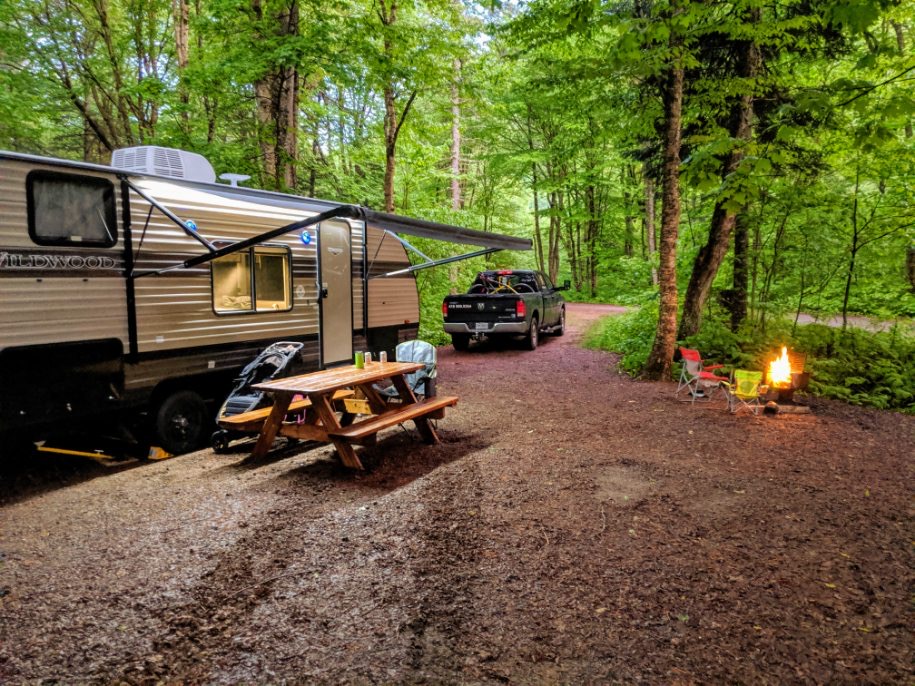
Crown Land (Canada)
If you are a Canadian resident, you are allowed to camp for free on crown lands if you’ve lived in Canada for 7 months from the preceding 12 months. You are allowed to camp for free for up to 21 days.
If you are a non-resident, you will need a permit to camp on crown lands. You will be able to camp for up to 21 days as well. If you are a non-resident, there will however be a small fee to stay on crown lands.
It’s important to be mindful of your environment. Do not harm plants or wildlife.
State parks, city parks, county parks, smaller federal agencies
You might be able to find some free campsite locations in State Parks, city parks, county parks, and smaller federal agencies too. Keep in mind that you might need to make reservations and there might not be any free campsites either.
Sometimes, these can be cheaper than a campground as there might be no amenities which can still save you a bit of money on your journey.
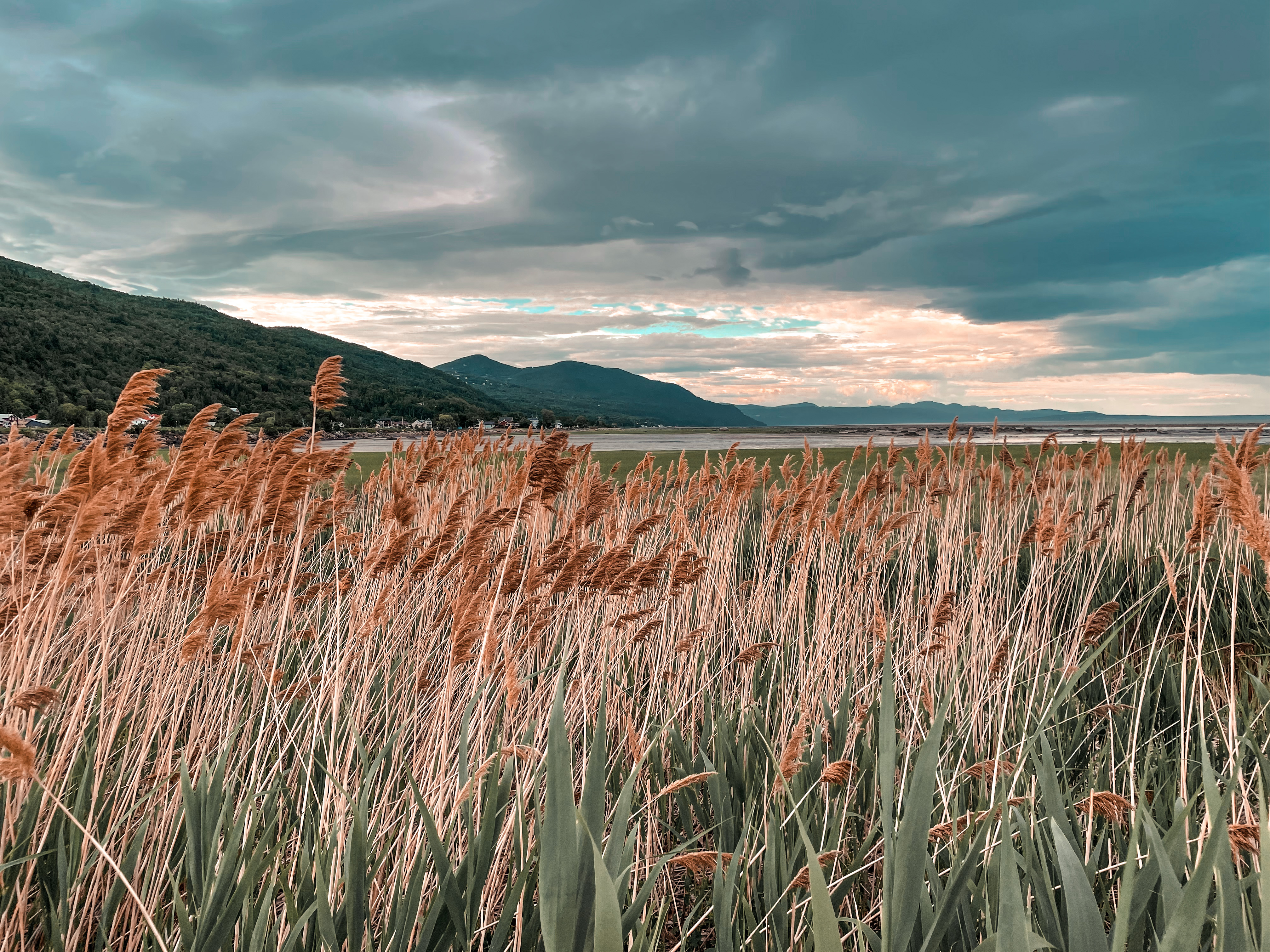
Best apps for finding free campsites
- IOverlander: This app will not only help you to find free campsites but you will also be able to find potable water along the way, dumping station, propane, and more!
- Allstays Camp & RV: This app will help you find campgrounds all over the United States and Canada, private spaces, national forests and state parks, city parks, BLM, and even more! You can also find RV rental dealers and services.
- Outly: The app is a great way to find great places to take advantage of free camping.
- Boondockers Welcome: To use boondockers welcome there is an annual fee. However, you will be able to find amazing properties where you can park for free. Choose a couple of hosts, contact them to set up your stay, and go! It’s that simple!
- Campendium: This website and app will help you find all types of campgrounds.
- US public lands: This app will be a great boondockers assistant. It will not show you free camping sites however, you will be able to view all public lands where you can camp. It will help you scout for your location. You’ll also be able to access every agency’s website to see their rules and regulations.
Websites to find free campsites
- The Dyrt: This website will help you find campsites for tents, RVs, and trailer campers all over the United States. The PRO version will also allow you to find free campsites.
- Free campsites.net: You will be able to find free campsites all over the world with their interactive map.

Other tools for finding free campsites
Road atlas and guide books
Find a road atlas or guide for the destination you are going to. Not only will you have tips and tricks but it will also give you some fun activities to do in the area. It will be of great help as well when you are trying to find somewhere to stay for the night. Whether it’s a campground, hotel, or motel, you are sure to find something to help you out in that department.
National Geographic maps
It’s always a good thing to carry some paper maps with you. Sometimes the cell coverage can be spotty or you might not have cell service at all! Having a paper map will help you out in those instances. From time to time, you might find other alternatives to the apps and websites you hadn’t seen before.
A great one to have with you is the National Geographic Road Atlas 2022: Adventure edition.
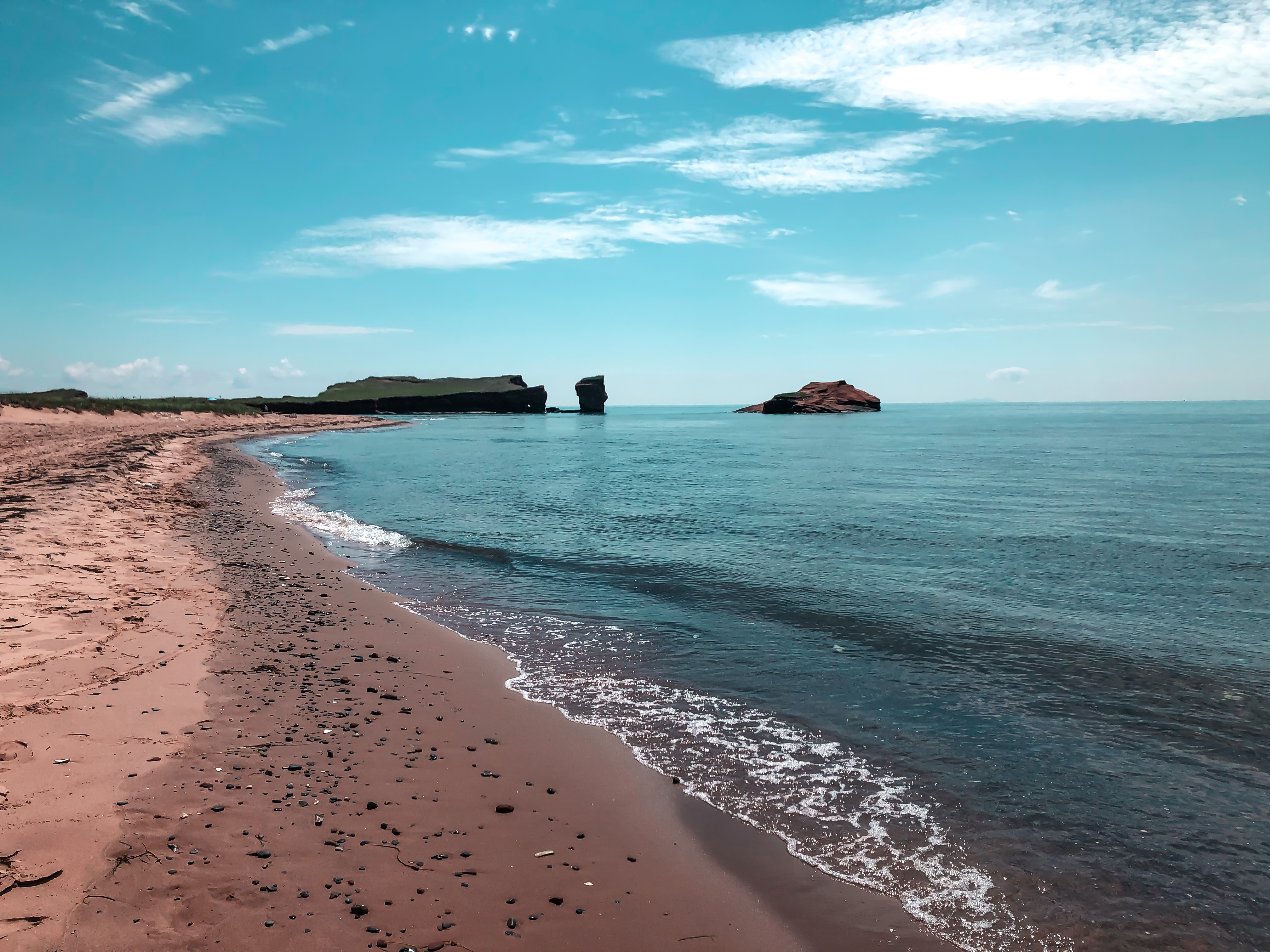
Other options for free overnight parking
Rest stops and truck stops
Truck stops will most likely offer more amenities. While stopping at a truck stop, you will most likely find fuel, restrooms, sometimes showers, and food. These are great to take advantage of while driving to freshen up, stock up on food and also get a good night’s sleep.
Staying overnight at a rest stock can be a bit more challenging as there are some rest stops that do not allow overnight camping. The purpose of the rest stop is to get some rest but not stay overnight.
Business parking lots
Business parking lots such as Walmart, Costco, casinos, home improvement stores, Camping World, Bass Pro Shop in Canada, and 24-hour fitness center just to name a few, are great places to find free camping for the night.
Most of these will allow you to camp for free. A great practice would be to talk to the manager before doing so to get approval. This way, you’ll be sure you won’t have any issues.
You could just call ahead and talk to the manager on the phone. They will also be able to point you to the right area to park so as to not obstruct their business during opening hours. It’s also a good thing for you to have a bit more privacy.
Municipal campgrounds
Municipal campgrounds are another way to get free camping. While it is not every municipal campground that allows free camping, you could spend the night there for a smaller fee than at a regular campground. You could still have a couple of amenities available for you to use
Harvest Host
To use Harvest Host, there is an annual fee of 99$. However, it is a great opportunity to camp at really cool places for free such as wineries, vineyards, breweries, distilleries, farms, and more.
With almost 3000 locations across the US, you are sure to have a great experience! It’s also a great way to support local businesses by buying their products.
To be able to use Harvest Host, you will have to have a self-contained RV with a toilet, water tank, and inside cooking facilities. No tents are allowed.
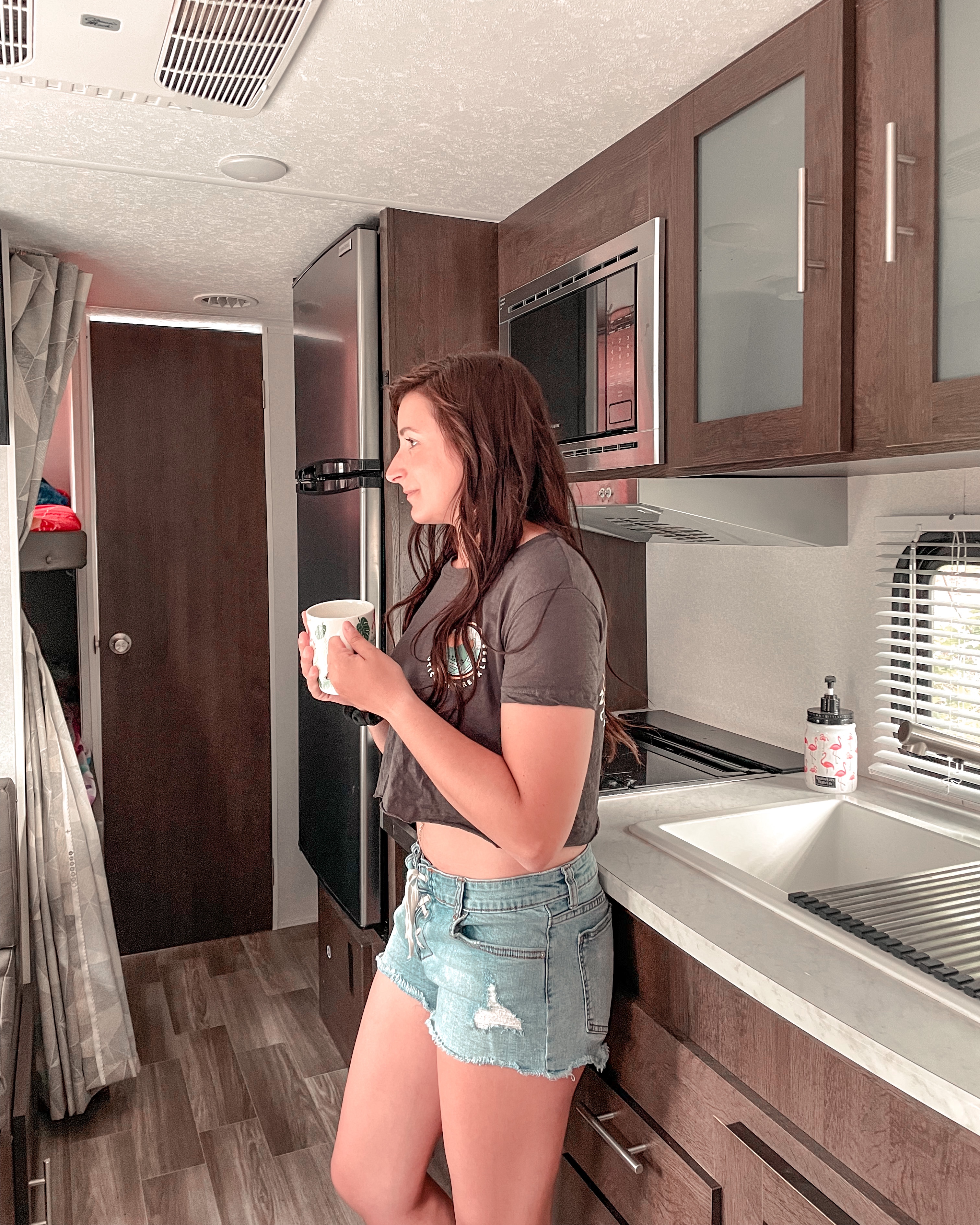
Where it’s not okay to free camp
Here are a couple of places you should never camp for obvious reasons. Avoid them to make sure you don’t get yourself into trouble.
- Airports
- Military bases or near the gates to enter the base
- Power plants
- Warehouses
- Construction sites
- Parks with playgrounds
- Schools, universities, and community colleges
- Private Property (unless you have permission from the owners or the land manager)
- Businesses that don’t allow overnight parking
- Any locations that have signs stating no overnight parking
If you would like to park in the parking lot of a business, always make sure to ask before doing so. You will be showing the owner that you respect them by asking permission and they might just grant it to you. If not, you will have to find somewhere else to stay but with all the options you have, it shouldn’t be an issue to do so.
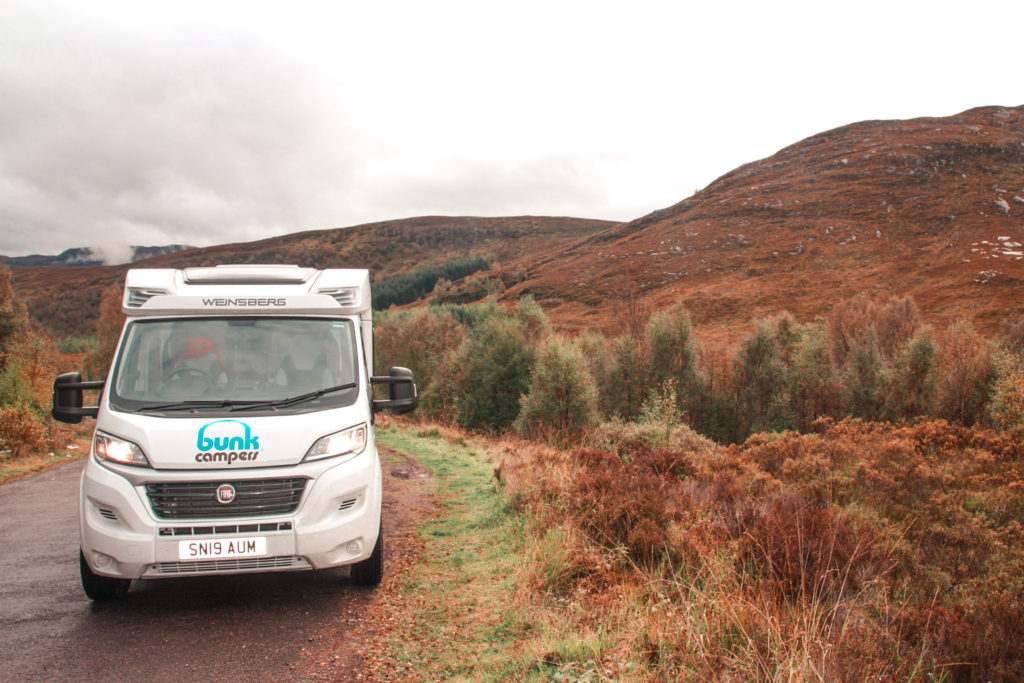
Leave no trace principles while free camping
While staying at free campsites will save you money, it’s important to leave it as you find it. Make it a better place for the next person that will be staying there. When you leave, make sure you take everything you brought back with you.
You can apply the leave no trace principle by minimizing waste, disposing of your waste properly, leaving rocks, plants, and other natural objects exactly where you found them, don’t build structures, minimizing your campfire impacts by keeping the fire small, and using designated fire areas, never feed animals around you, observe them from a distance and, respect others around you as well!
To get more tips, make sure to read how to take an eco-friendly road trip!
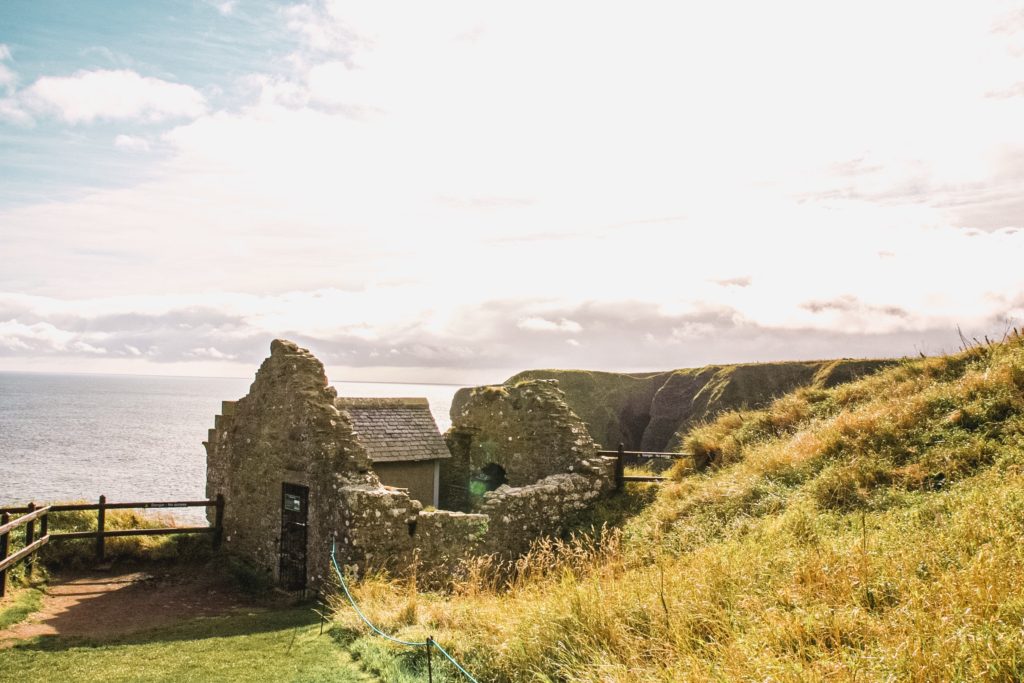
Essential camping items
If you are planning to do some free camping, it’s important to have a couple of things with you. These will be important to ensure your safety, ensure your comfort and also ensure that you have everything needed to get you to spend a great time outdoors with no one and nothing around you.
Car Camping Essentials
Pack your tent if needed, and a cooler for your food.
Keep on reading for other essentials.
Camp Kitchen items
Carry your cooking stove and fuel, pots and pans, plates, bowls, utensils, a cutting knife, a cutting board, cups, mugs, a drinking bottle, a coffee kit, and cooking utensils as well.
Also bring a camp kitchen sink, dish soap and a sponge, some trash bags and paper towels.
Portable water
If you are going to do some dispersed camping with an RV, trailer camper, or a van, you will most likely be equipped with a water tank. Make sure to fill it up before going to your location. This will come in handy to shower or clean up a little bit, do your dishes, and drink.
Going dispersed camping in a tent? Don’t worry, you can still bring some water with you to do all those things. You can buy a water jug and fill it up before going to your location.
I have a travel trailer and when we go boondocking somewhere, we always carry an extra water tank anyway.
If you are looking to buy one, you can order this Scepter 5-gallon water container!
Water filtration system
This will be especially important if you don’t have potable water with you to filter it.
I like to bring my water container to use as drinking water and use our water tank from our camper for cooking, dishes and showering.
Extra fuel
Does going to your campsite get off the beaten path? Carry some extra fuel just in case you run out of gas on your way back. Sometimes, traveling to these extra cool spots, you’ll need extra gas than what you actually have.
This will avoid getting stuck somewhere the tow truck doesn’t have access to help you out.
Safety items
Bring a First-Aid kit, a tire traction kit in case you get stuck, an emergency vehicle kit, a portable power bank to keep your electronics charged, and window coverings.
If you think of anything else you might need for your safety on the road, make sure to bring them with you.
Items for sleeping
While sleeping in a van, you might already have your bed and pillows there. However, if you are camping in your tent, don’t forget to bring your sleeping bags, pillows, extra blankets, and a small mattress to have a little bit more comfort while sleeping.
Bring what you need to sleep comfortably even in the wild but keep in mind that you will also have to carry everything in your car but also if you have to hike a bit to get to your spot.
Items for comfort
What are you planning to do while at your campsite? Bring some folding chairs so you can sit and relax enjoying the outdoors and the fire. A small foldable table can be a good thing to bring too. There probably won’t be a picnic table at your spot.
Whatever you plan on doing, bring what you will need with you so you can enjoy that time.
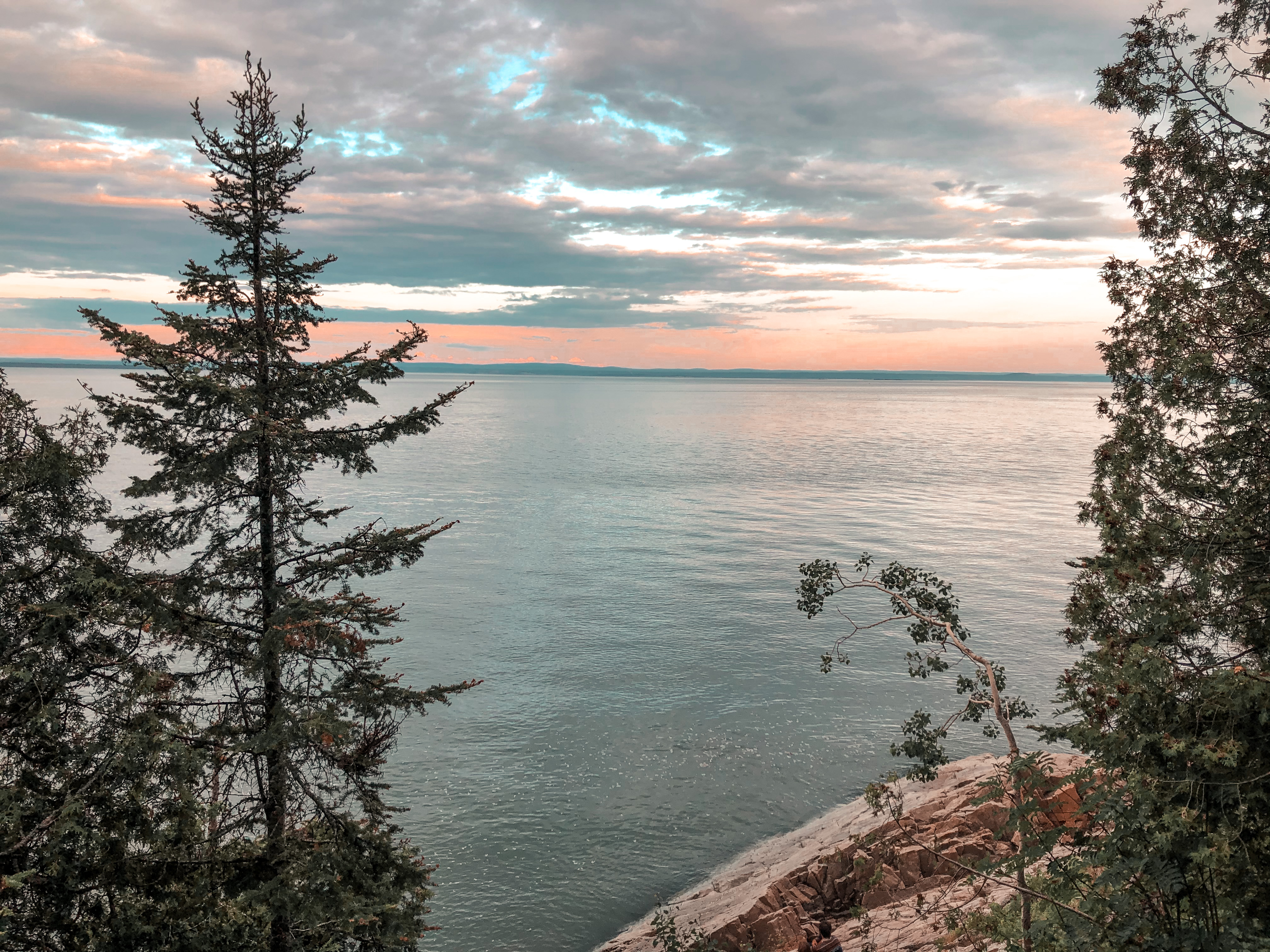
Staying safe when free camping
- It’s always easier to find something while it is still daylight outside. Do your campsite research at least during the day. You might get to the campsite when it is dark but if you’ve looked at maps and found a couple of free campsites you might be able to stay at during the night, it will be easier for you to find the area. It’s a lot harder to try and find somewhere while looking at maps in the dark. It can also add a bit of stress if you are trying to find something late at night to park. By doing your research beforehand, you will have a couple of options in case one doesn’t work out.
- Trust your instincts. If you get to the campsite you chose and there’s just this feeling that you can’t make a sense of, listen to your gut. Don’t stay somewhere you don’t feel safe. You’ll end up worrying, and stressing and you might not even sleep well. If you don’t feel comfortable, don’t worry about it and find a different spot. Always trust your instincts!
- Always let someone know your location. While staying in free campsites, you are sure to find some pretty amazing areas you can camp in with no one in sight and an amazing view on top of that. Make sure you tell someone where you are though. Most likely, you will be safe, but just in case something were to happen, at least someone knows where you last camped.
- Keep your windows covered when it is possible. Here again, it will help prevent theft. While you’re gone, close off those curtains. At night, close them too. While you’re around, you don’t necessarily need to close them up but at least don’t let valuables be too visible to the outside world. This will prevent people from looking inside.
- Be careful what you show to the outside world. Especially when you are leaving your campsite or van unattended, make sure to put away all your valuables so as to not encourage someone nearby to come and take a look and even steal some stuff.
- While getting settled for the evening, make it easy to leave in case you have to leave the area quickly. This way, if something were to happen and you needed to get out of that campsite in a hurry, you won’t have a million things to pick up around your campsite while trying to rush out as fast as you can.
- Have an emergency plan in place as well. Where will you go if something happens? Where will you meet up if you get separated? What are your escape routes from the van or camper? Where is the road to get you out of the campsite in case of an emergency? Put up a little plan to be safe.
- Always lock up behind you. If you are leaving the vicinity of your campsite, make sure to lock your doors before leaving. This will help you prevent theft or anyone tampering with your stuff.
- Have some sort of weapon in case an intruder comes into your camper or van. I’m not saying to carry a gun, but if someone were to come inside your van at night, ask yourself what could come in handy that would help you fend off that said intruder. Know where those ”weapons” are inside so you’re not fumbling to find them if needed.
- I personally prefer to stay private, especially on social media. I’ll let my family know where I am but I won’t be posting anything in real-time. It’s OK to mention your travel plans but try doing so once you’ve left that location. It is so easy nowadays to stalk someone with social media. Stay private about your travel plans beforehand. Once you leave the area, you can definitely post something about your experience and beautiful pictures but it will make it harder for someone to know exactly where you are.
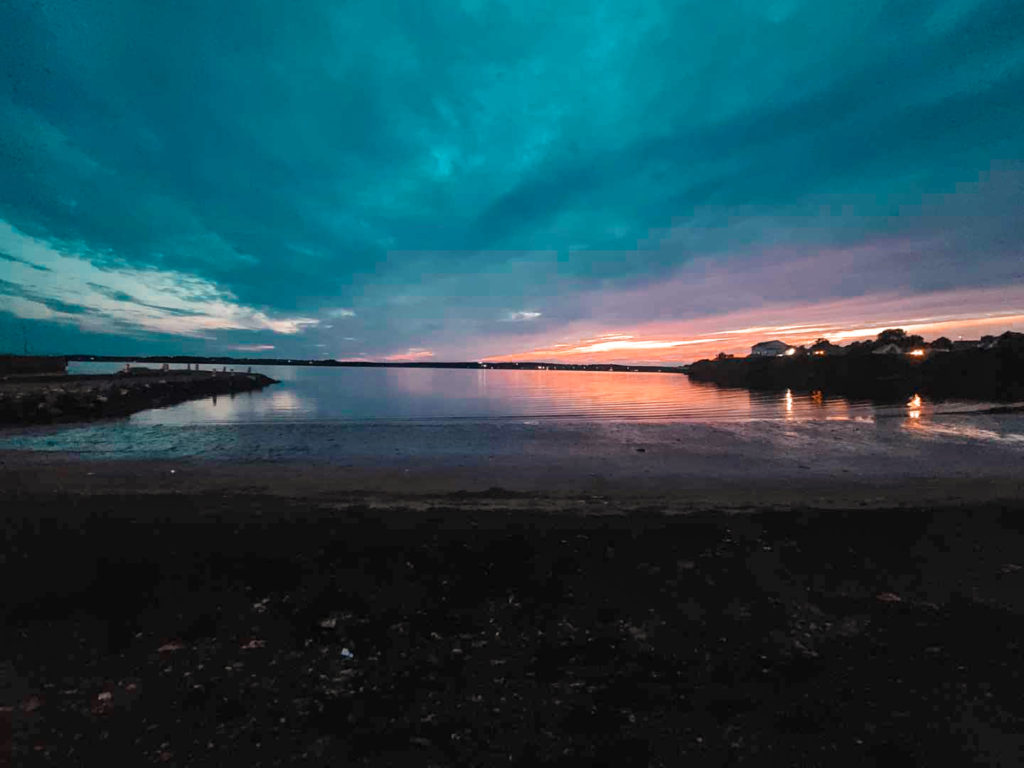
The key to having great experiences while doing some dispersed camping is to be prepared. You don’t want to get to your greatest spot yet and be missing the essentials! While boondocking, it’s also super important to use the leave no trace principle. Make sure you bring back everything you arrived with and be respectful of others.
While free camping is a privilege, make sure it stays that way and that others can have a beautiful and fun experience doing so.
These are just a couple of resources to help you find free campsites across North America. Have other resources you use to guide you to a great free campsite? Leave them in the comments so others can also use them!

Disclosure: Please note that some of the links above are affiliate links. At no additional cost to you, I earn a small commission if you make a purchase through these links. I would never recommend anything I don’t personally love and use!
In need of some more inspiration for your next trip? Or even ways to entertain everyone? What about planning tools? Here are all the best resources for you!
18 of the best road trip planning tools
27 common road trip mistakes to avoid
How to take an eco-friendly road trip
Summer camping gear packing guide
How to keep your car organized on a road trip
